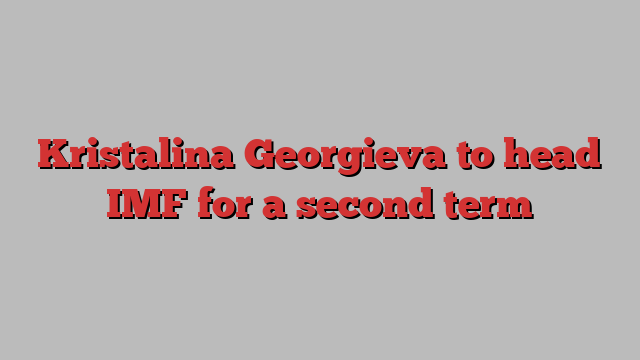
Unlock the Editor’s Digest for free
Roula Khalaf, Editor of the FT, selects her favourite stories in this weekly newsletter.
Kristalina Georgieva has won a second five-year term as IMF managing director, ahead of the start of the fund’s spring meetings in Washington next week.
Georgieva, who has been in the role since the autumn of 2019, was the sole candidate for the position. However, it was only after European leaders signalled that they would endorse her last month that her candidacy was assured.
The Bulgarian economist faced controversy in 2021 over her role in a scandal relating to her time at the World Bank, with an internal inquiry accusing her of directing efforts to artificially boost China’s ranking in the lender’s influential annual Doing Business report.
Georgieva said at the time that she fundamentally disagreed with the conclusions of the World Bank report. The IMF executive board later declared it had “full confidence” in the managing director, after launching its own internal probe.
Her desire for the IMF to play a bigger role in mitigating climate change, and the departure of former senior official David Lipton, are also thought to have led to some criticism from shareholders and fund staff.
However, Georgieva also managed to steer the IMF through the pandemic, with it approving more than $360bn in new financing; debt service relief to the poorest countries; and an allocation of special drawing rights, the IMF’s in-house unit of account, worth $650bn. In 2023, the fund also approved a $15.6bn aid package for Ukraine, the first time it had done so for a country at war.
“In taking this decision, the board commended Ms Georgieva’s strong and agile leadership during her term, navigating a series of major global shocks,” board co-ordinators Afonso Bevilaqua and Abdullah BinZarah said on Friday.
Georgieva said she was “deeply grateful for the trust and support” the board had placed in her.
She is set to welcome leaders to the US capital over the coming days, where IMF officials are expected to warn finance ministers and central bank governors that they need to do more to boost productivity and lower fast-rising debt burdens. That is despite upgrades to their global economic projections showing that the global economy has managed to avoid a much-feared recession.
The fund will also host a Global Sovereign Debt roundtable, where it is hoped China and other big bilateral creditors can make progress on restructuring the debts of some of the world’s most vulnerable economies.
Europe holds sway in nominating successful candidates for the managing director job at the IMF, with the position taken by someone from the continent. World Bank presidents tend to hail from the US or hold US citizenship.
Paschal Donohoe, Ireland’s former finance minister, was mooted as a possible candidate earlier this year, but eventually decided not to run.